Counselling and Psychotherapy: Ethical and Legal Considerations
VerifiedAdded on 2021/06/17
|16
|4294
|35
Essay
AI Summary
This essay provides a detailed overview of counselling and psychotherapy, examining the historical development and professional landscape within the United Kingdom, with a particular focus on the British Psychological Society (BPS) and the British Association for Counselling and Psychotherapy (BACP). It delves into the ethical frameworks, professional codes, and legal regulations that govern the practice of counselling, including confidentiality, client rights, and agency policies. The essay analyzes the principles and guidelines proposed by Tim Bond, along with the ethical considerations of dual relationships and the evolution of therapeutic approaches, including the impact of empirically supported treatment (EST) protocols. It highlights the importance of ethical practice, client care, and the need for formal and professional development within the field, providing a comprehensive understanding of the complexities and responsibilities inherent in counselling and psychotherapy.
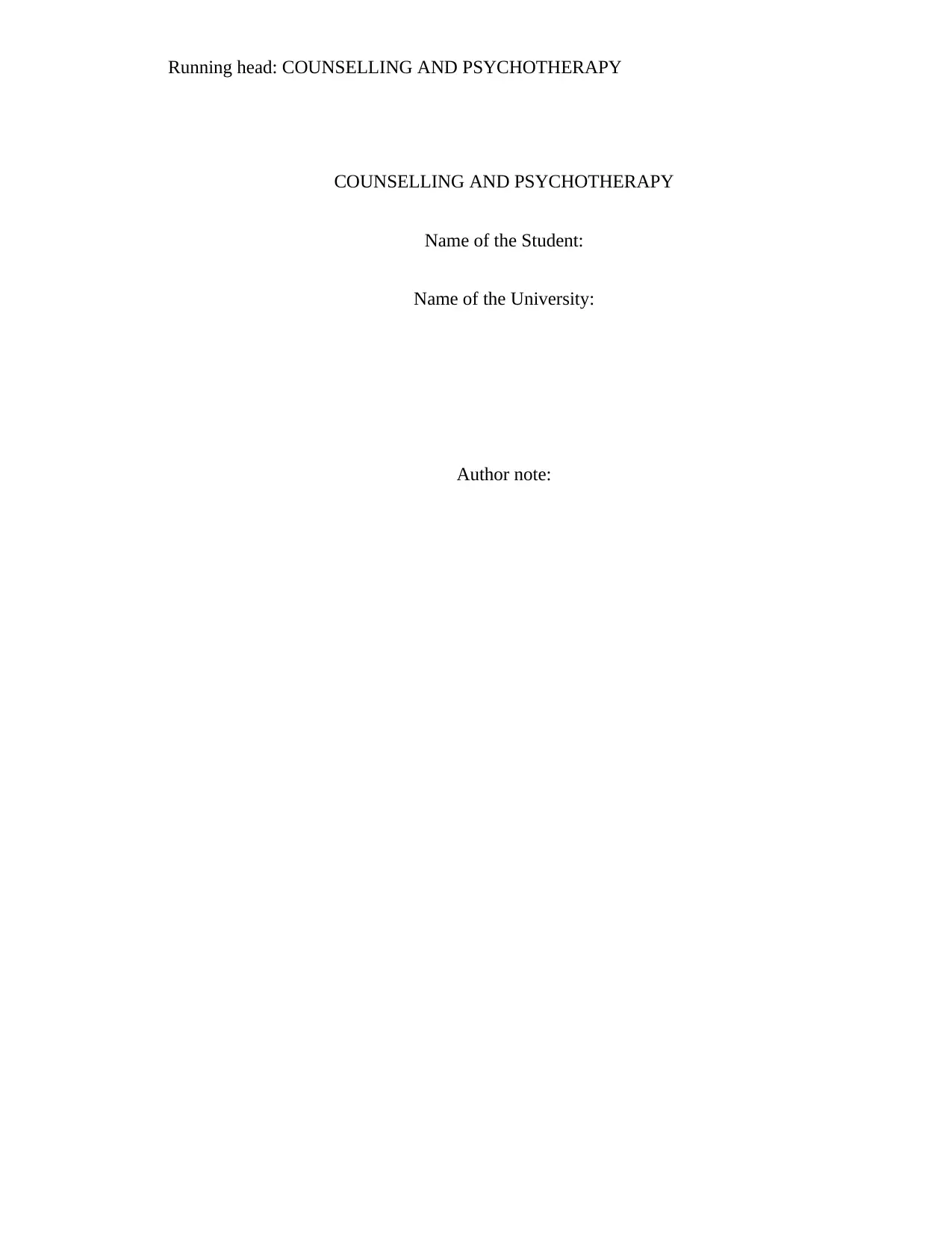
Running head: COUNSELLING AND PSYCHOTHERAPY
COUNSELLING AND PSYCHOTHERAPY
Name of the Student:
Name of the University:
Author note:
COUNSELLING AND PSYCHOTHERAPY
Name of the Student:
Name of the University:
Author note:
Paraphrase This Document
Need a fresh take? Get an instant paraphrase of this document with our AI Paraphraser
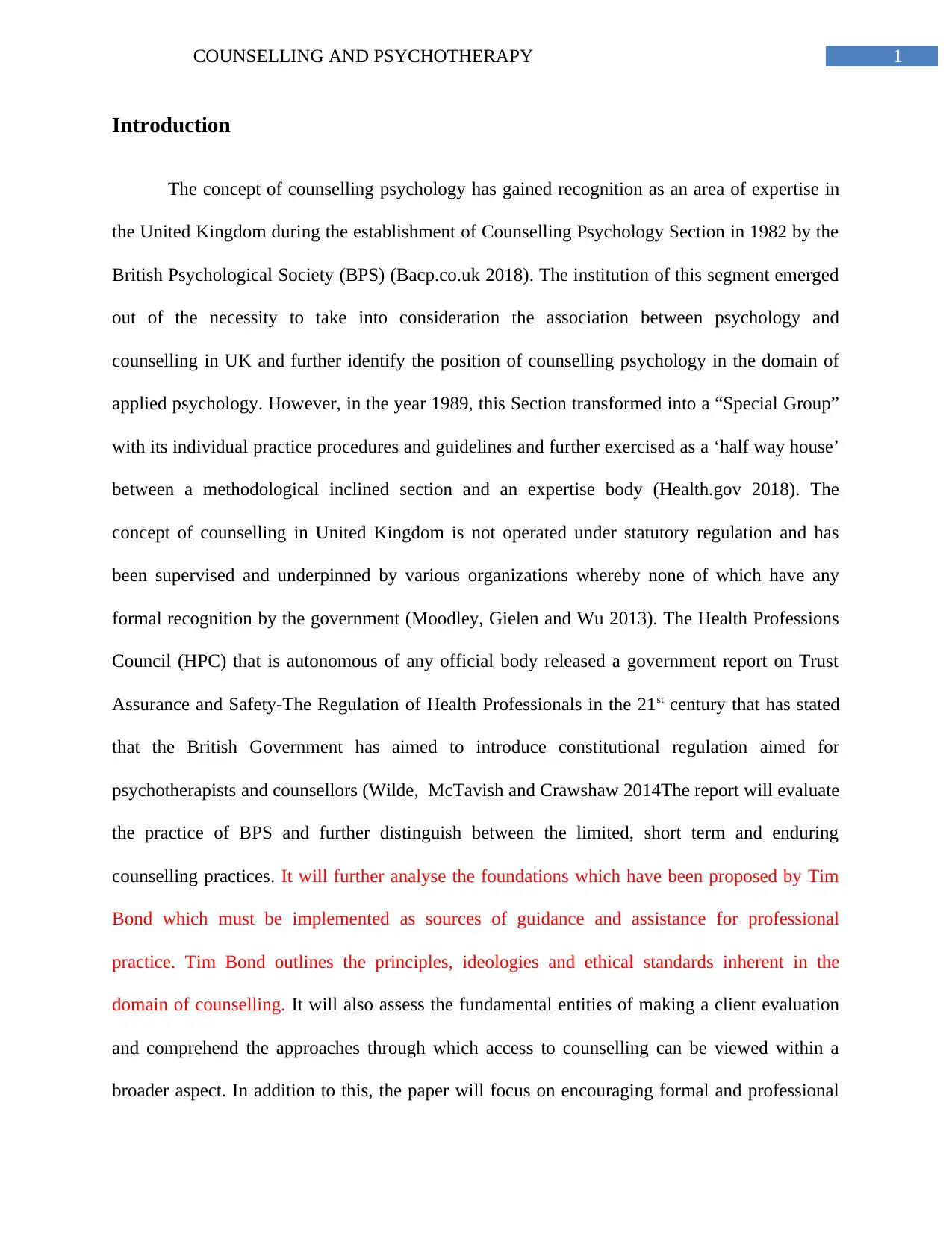
1COUNSELLING AND PSYCHOTHERAPY
Introduction
The concept of counselling psychology has gained recognition as an area of expertise in
the United Kingdom during the establishment of Counselling Psychology Section in 1982 by the
British Psychological Society (BPS) (Bacp.co.uk 2018). The institution of this segment emerged
out of the necessity to take into consideration the association between psychology and
counselling in UK and further identify the position of counselling psychology in the domain of
applied psychology. However, in the year 1989, this Section transformed into a “Special Group”
with its individual practice procedures and guidelines and further exercised as a ‘half way house’
between a methodological inclined section and an expertise body (Health.gov 2018). The
concept of counselling in United Kingdom is not operated under statutory regulation and has
been supervised and underpinned by various organizations whereby none of which have any
formal recognition by the government (Moodley, Gielen and Wu 2013). The Health Professions
Council (HPC) that is autonomous of any official body released a government report on Trust
Assurance and Safety-The Regulation of Health Professionals in the 21st century that has stated
that the British Government has aimed to introduce constitutional regulation aimed for
psychotherapists and counsellors (Wilde, McTavish and Crawshaw 2014The report will evaluate
the practice of BPS and further distinguish between the limited, short term and enduring
counselling practices. It will further analyse the foundations which have been proposed by Tim
Bond which must be implemented as sources of guidance and assistance for professional
practice. Tim Bond outlines the principles, ideologies and ethical standards inherent in the
domain of counselling. It will also assess the fundamental entities of making a client evaluation
and comprehend the approaches through which access to counselling can be viewed within a
broader aspect. In addition to this, the paper will focus on encouraging formal and professional
Introduction
The concept of counselling psychology has gained recognition as an area of expertise in
the United Kingdom during the establishment of Counselling Psychology Section in 1982 by the
British Psychological Society (BPS) (Bacp.co.uk 2018). The institution of this segment emerged
out of the necessity to take into consideration the association between psychology and
counselling in UK and further identify the position of counselling psychology in the domain of
applied psychology. However, in the year 1989, this Section transformed into a “Special Group”
with its individual practice procedures and guidelines and further exercised as a ‘half way house’
between a methodological inclined section and an expertise body (Health.gov 2018). The
concept of counselling in United Kingdom is not operated under statutory regulation and has
been supervised and underpinned by various organizations whereby none of which have any
formal recognition by the government (Moodley, Gielen and Wu 2013). The Health Professions
Council (HPC) that is autonomous of any official body released a government report on Trust
Assurance and Safety-The Regulation of Health Professionals in the 21st century that has stated
that the British Government has aimed to introduce constitutional regulation aimed for
psychotherapists and counsellors (Wilde, McTavish and Crawshaw 2014The report will evaluate
the practice of BPS and further distinguish between the limited, short term and enduring
counselling practices. It will further analyse the foundations which have been proposed by Tim
Bond which must be implemented as sources of guidance and assistance for professional
practice. Tim Bond outlines the principles, ideologies and ethical standards inherent in the
domain of counselling. It will also assess the fundamental entities of making a client evaluation
and comprehend the approaches through which access to counselling can be viewed within a
broader aspect. In addition to this, the paper will focus on encouraging formal and professional
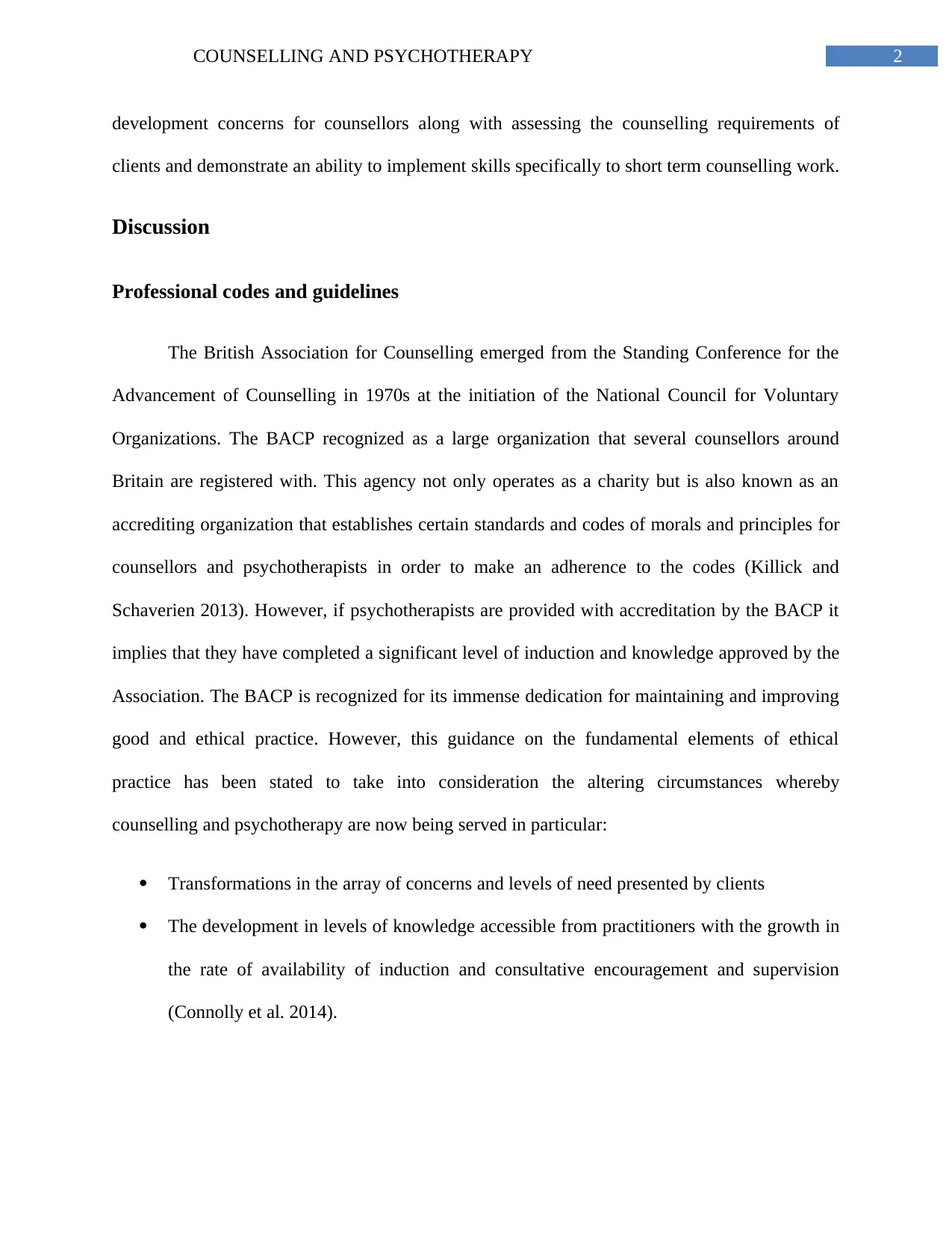
2COUNSELLING AND PSYCHOTHERAPY
development concerns for counsellors along with assessing the counselling requirements of
clients and demonstrate an ability to implement skills specifically to short term counselling work.
Discussion
Professional codes and guidelines
The British Association for Counselling emerged from the Standing Conference for the
Advancement of Counselling in 1970s at the initiation of the National Council for Voluntary
Organizations. The BACP recognized as a large organization that several counsellors around
Britain are registered with. This agency not only operates as a charity but is also known as an
accrediting organization that establishes certain standards and codes of morals and principles for
counsellors and psychotherapists in order to make an adherence to the codes (Killick and
Schaverien 2013). However, if psychotherapists are provided with accreditation by the BACP it
implies that they have completed a significant level of induction and knowledge approved by the
Association. The BACP is recognized for its immense dedication for maintaining and improving
good and ethical practice. However, this guidance on the fundamental elements of ethical
practice has been stated to take into consideration the altering circumstances whereby
counselling and psychotherapy are now being served in particular:
Transformations in the array of concerns and levels of need presented by clients
The development in levels of knowledge accessible from practitioners with the growth in
the rate of availability of induction and consultative encouragement and supervision
(Connolly et al. 2014).
development concerns for counsellors along with assessing the counselling requirements of
clients and demonstrate an ability to implement skills specifically to short term counselling work.
Discussion
Professional codes and guidelines
The British Association for Counselling emerged from the Standing Conference for the
Advancement of Counselling in 1970s at the initiation of the National Council for Voluntary
Organizations. The BACP recognized as a large organization that several counsellors around
Britain are registered with. This agency not only operates as a charity but is also known as an
accrediting organization that establishes certain standards and codes of morals and principles for
counsellors and psychotherapists in order to make an adherence to the codes (Killick and
Schaverien 2013). However, if psychotherapists are provided with accreditation by the BACP it
implies that they have completed a significant level of induction and knowledge approved by the
Association. The BACP is recognized for its immense dedication for maintaining and improving
good and ethical practice. However, this guidance on the fundamental elements of ethical
practice has been stated to take into consideration the altering circumstances whereby
counselling and psychotherapy are now being served in particular:
Transformations in the array of concerns and levels of need presented by clients
The development in levels of knowledge accessible from practitioners with the growth in
the rate of availability of induction and consultative encouragement and supervision
(Connolly et al. 2014).
⊘ This is a preview!⊘
Do you want full access?
Subscribe today to unlock all pages.

Trusted by 1+ million students worldwide
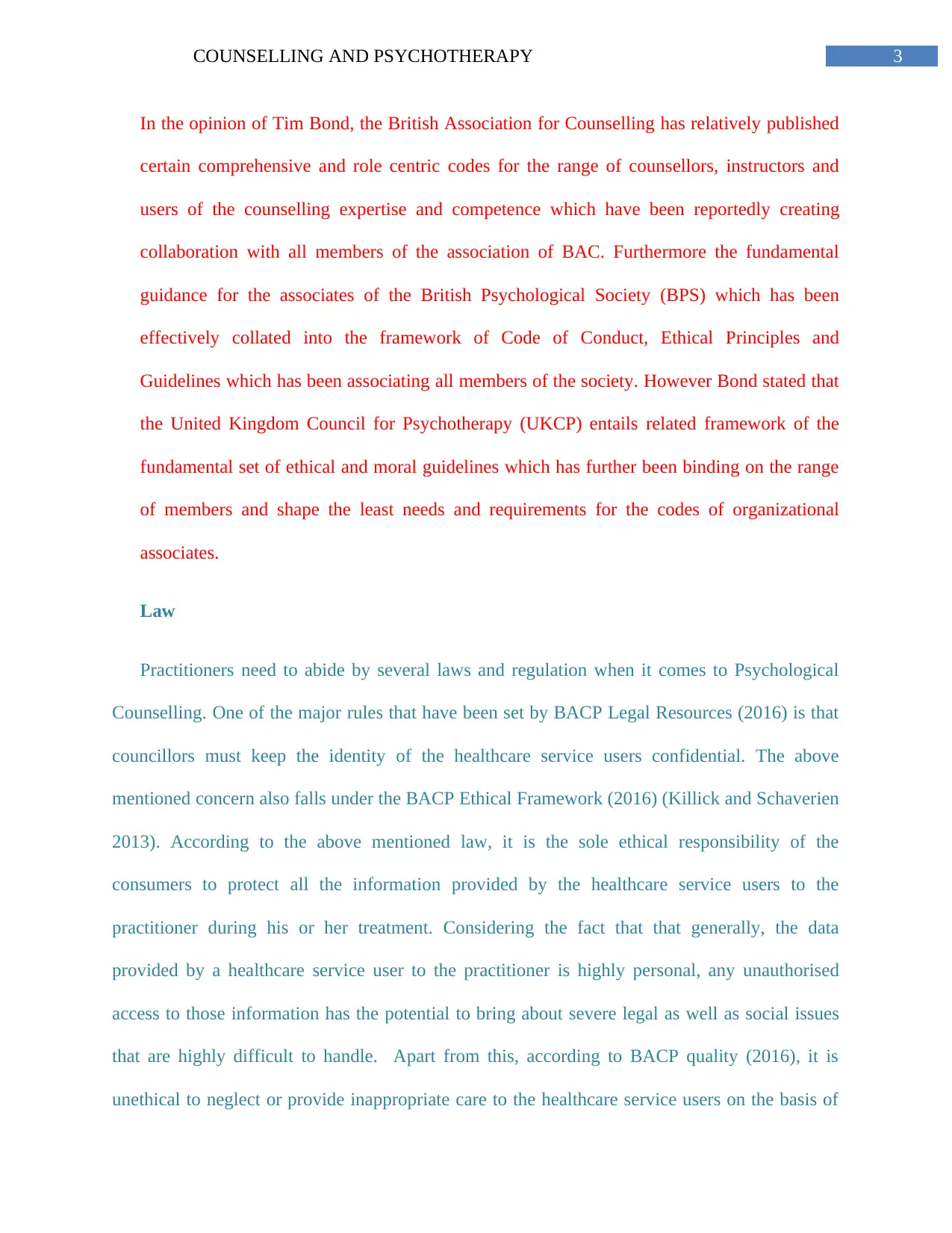
3COUNSELLING AND PSYCHOTHERAPY
In the opinion of Tim Bond, the British Association for Counselling has relatively published
certain comprehensive and role centric codes for the range of counsellors, instructors and
users of the counselling expertise and competence which have been reportedly creating
collaboration with all members of the association of BAC. Furthermore the fundamental
guidance for the associates of the British Psychological Society (BPS) which has been
effectively collated into the framework of Code of Conduct, Ethical Principles and
Guidelines which has been associating all members of the society. However Bond stated that
the United Kingdom Council for Psychotherapy (UKCP) entails related framework of the
fundamental set of ethical and moral guidelines which has further been binding on the range
of members and shape the least needs and requirements for the codes of organizational
associates.
Law
Practitioners need to abide by several laws and regulation when it comes to Psychological
Counselling. One of the major rules that have been set by BACP Legal Resources (2016) is that
councillors must keep the identity of the healthcare service users confidential. The above
mentioned concern also falls under the BACP Ethical Framework (2016) (Killick and Schaverien
2013). According to the above mentioned law, it is the sole ethical responsibility of the
consumers to protect all the information provided by the healthcare service users to the
practitioner during his or her treatment. Considering the fact that that generally, the data
provided by a healthcare service user to the practitioner is highly personal, any unauthorised
access to those information has the potential to bring about severe legal as well as social issues
that are highly difficult to handle. Apart from this, according to BACP quality (2016), it is
unethical to neglect or provide inappropriate care to the healthcare service users on the basis of
In the opinion of Tim Bond, the British Association for Counselling has relatively published
certain comprehensive and role centric codes for the range of counsellors, instructors and
users of the counselling expertise and competence which have been reportedly creating
collaboration with all members of the association of BAC. Furthermore the fundamental
guidance for the associates of the British Psychological Society (BPS) which has been
effectively collated into the framework of Code of Conduct, Ethical Principles and
Guidelines which has been associating all members of the society. However Bond stated that
the United Kingdom Council for Psychotherapy (UKCP) entails related framework of the
fundamental set of ethical and moral guidelines which has further been binding on the range
of members and shape the least needs and requirements for the codes of organizational
associates.
Law
Practitioners need to abide by several laws and regulation when it comes to Psychological
Counselling. One of the major rules that have been set by BACP Legal Resources (2016) is that
councillors must keep the identity of the healthcare service users confidential. The above
mentioned concern also falls under the BACP Ethical Framework (2016) (Killick and Schaverien
2013). According to the above mentioned law, it is the sole ethical responsibility of the
consumers to protect all the information provided by the healthcare service users to the
practitioner during his or her treatment. Considering the fact that that generally, the data
provided by a healthcare service user to the practitioner is highly personal, any unauthorised
access to those information has the potential to bring about severe legal as well as social issues
that are highly difficult to handle. Apart from this, according to BACP quality (2016), it is
unethical to neglect or provide inappropriate care to the healthcare service users on the basis of
Paraphrase This Document
Need a fresh take? Get an instant paraphrase of this document with our AI Paraphraser
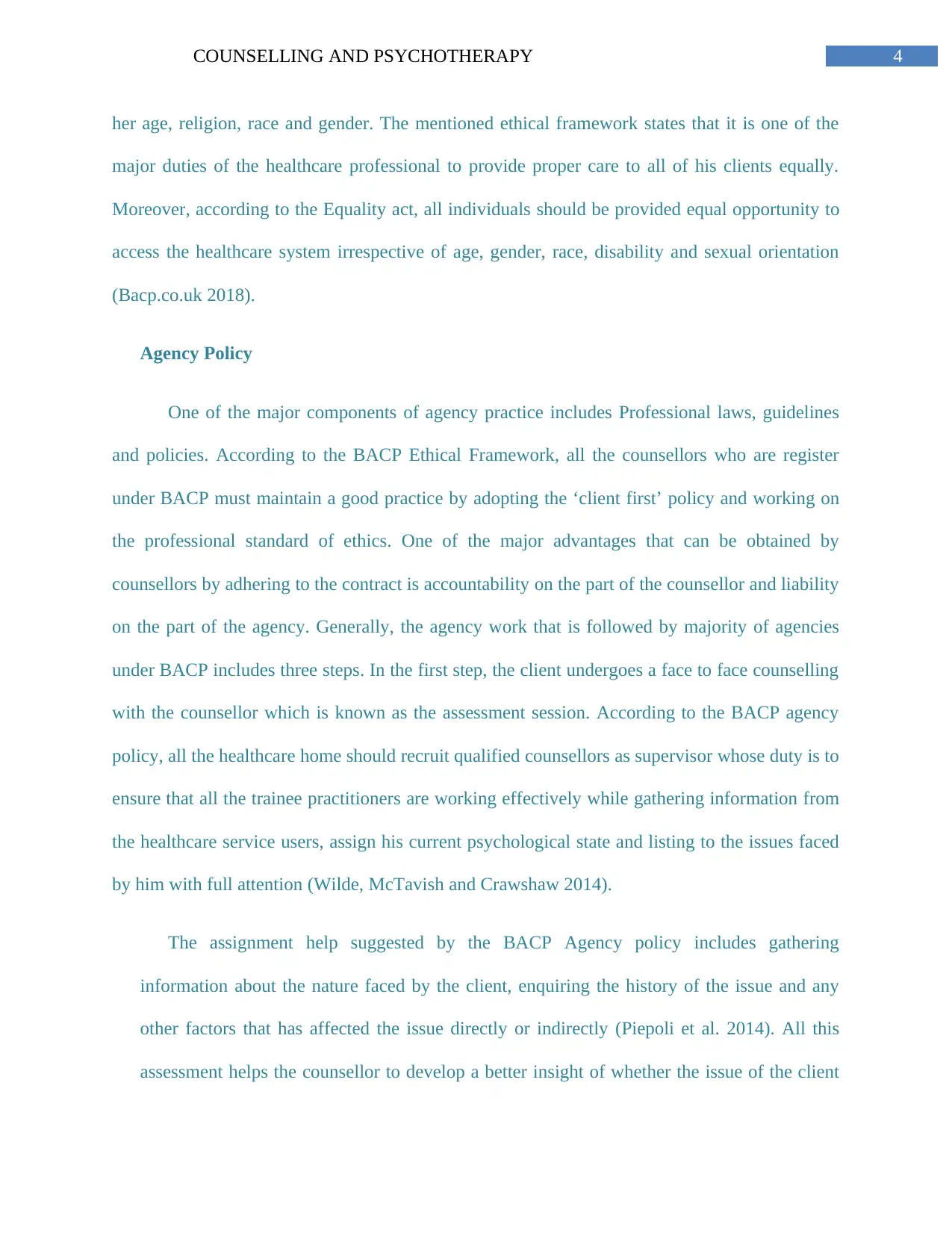
4COUNSELLING AND PSYCHOTHERAPY
her age, religion, race and gender. The mentioned ethical framework states that it is one of the
major duties of the healthcare professional to provide proper care to all of his clients equally.
Moreover, according to the Equality act, all individuals should be provided equal opportunity to
access the healthcare system irrespective of age, gender, race, disability and sexual orientation
(Bacp.co.uk 2018).
Agency Policy
One of the major components of agency practice includes Professional laws, guidelines
and policies. According to the BACP Ethical Framework, all the counsellors who are register
under BACP must maintain a good practice by adopting the ‘client first’ policy and working on
the professional standard of ethics. One of the major advantages that can be obtained by
counsellors by adhering to the contract is accountability on the part of the counsellor and liability
on the part of the agency. Generally, the agency work that is followed by majority of agencies
under BACP includes three steps. In the first step, the client undergoes a face to face counselling
with the counsellor which is known as the assessment session. According to the BACP agency
policy, all the healthcare home should recruit qualified counsellors as supervisor whose duty is to
ensure that all the trainee practitioners are working effectively while gathering information from
the healthcare service users, assign his current psychological state and listing to the issues faced
by him with full attention (Wilde, McTavish and Crawshaw 2014).
The assignment help suggested by the BACP Agency policy includes gathering
information about the nature faced by the client, enquiring the history of the issue and any
other factors that has affected the issue directly or indirectly (Piepoli et al. 2014). All this
assessment helps the counsellor to develop a better insight of whether the issue of the client
her age, religion, race and gender. The mentioned ethical framework states that it is one of the
major duties of the healthcare professional to provide proper care to all of his clients equally.
Moreover, according to the Equality act, all individuals should be provided equal opportunity to
access the healthcare system irrespective of age, gender, race, disability and sexual orientation
(Bacp.co.uk 2018).
Agency Policy
One of the major components of agency practice includes Professional laws, guidelines
and policies. According to the BACP Ethical Framework, all the counsellors who are register
under BACP must maintain a good practice by adopting the ‘client first’ policy and working on
the professional standard of ethics. One of the major advantages that can be obtained by
counsellors by adhering to the contract is accountability on the part of the counsellor and liability
on the part of the agency. Generally, the agency work that is followed by majority of agencies
under BACP includes three steps. In the first step, the client undergoes a face to face counselling
with the counsellor which is known as the assessment session. According to the BACP agency
policy, all the healthcare home should recruit qualified counsellors as supervisor whose duty is to
ensure that all the trainee practitioners are working effectively while gathering information from
the healthcare service users, assign his current psychological state and listing to the issues faced
by him with full attention (Wilde, McTavish and Crawshaw 2014).
The assignment help suggested by the BACP Agency policy includes gathering
information about the nature faced by the client, enquiring the history of the issue and any
other factors that has affected the issue directly or indirectly (Piepoli et al. 2014). All this
assessment helps the counsellor to develop a better insight of whether the issue of the client
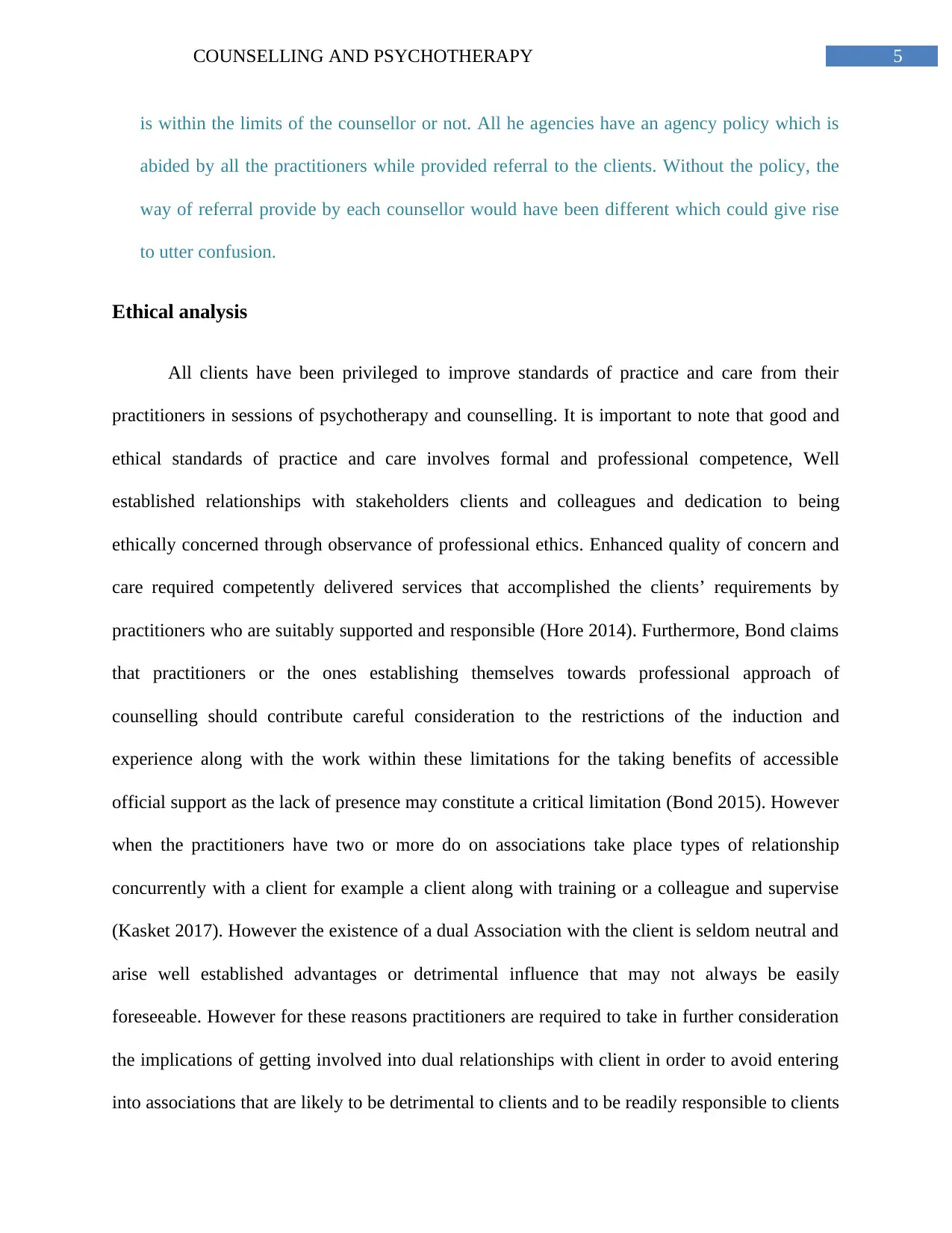
5COUNSELLING AND PSYCHOTHERAPY
is within the limits of the counsellor or not. All he agencies have an agency policy which is
abided by all the practitioners while provided referral to the clients. Without the policy, the
way of referral provide by each counsellor would have been different which could give rise
to utter confusion.
Ethical analysis
All clients have been privileged to improve standards of practice and care from their
practitioners in sessions of psychotherapy and counselling. It is important to note that good and
ethical standards of practice and care involves formal and professional competence, Well
established relationships with stakeholders clients and colleagues and dedication to being
ethically concerned through observance of professional ethics. Enhanced quality of concern and
care required competently delivered services that accomplished the clients’ requirements by
practitioners who are suitably supported and responsible (Hore 2014). Furthermore, Bond claims
that practitioners or the ones establishing themselves towards professional approach of
counselling should contribute careful consideration to the restrictions of the induction and
experience along with the work within these limitations for the taking benefits of accessible
official support as the lack of presence may constitute a critical limitation (Bond 2015). However
when the practitioners have two or more do on associations take place types of relationship
concurrently with a client for example a client along with training or a colleague and supervise
(Kasket 2017). However the existence of a dual Association with the client is seldom neutral and
arise well established advantages or detrimental influence that may not always be easily
foreseeable. However for these reasons practitioners are required to take in further consideration
the implications of getting involved into dual relationships with client in order to avoid entering
into associations that are likely to be detrimental to clients and to be readily responsible to clients
is within the limits of the counsellor or not. All he agencies have an agency policy which is
abided by all the practitioners while provided referral to the clients. Without the policy, the
way of referral provide by each counsellor would have been different which could give rise
to utter confusion.
Ethical analysis
All clients have been privileged to improve standards of practice and care from their
practitioners in sessions of psychotherapy and counselling. It is important to note that good and
ethical standards of practice and care involves formal and professional competence, Well
established relationships with stakeholders clients and colleagues and dedication to being
ethically concerned through observance of professional ethics. Enhanced quality of concern and
care required competently delivered services that accomplished the clients’ requirements by
practitioners who are suitably supported and responsible (Hore 2014). Furthermore, Bond claims
that practitioners or the ones establishing themselves towards professional approach of
counselling should contribute careful consideration to the restrictions of the induction and
experience along with the work within these limitations for the taking benefits of accessible
official support as the lack of presence may constitute a critical limitation (Bond 2015). However
when the practitioners have two or more do on associations take place types of relationship
concurrently with a client for example a client along with training or a colleague and supervise
(Kasket 2017). However the existence of a dual Association with the client is seldom neutral and
arise well established advantages or detrimental influence that may not always be easily
foreseeable. However for these reasons practitioners are required to take in further consideration
the implications of getting involved into dual relationships with client in order to avoid entering
into associations that are likely to be detrimental to clients and to be readily responsible to clients
⊘ This is a preview!⊘
Do you want full access?
Subscribe today to unlock all pages.

Trusted by 1+ million students worldwide
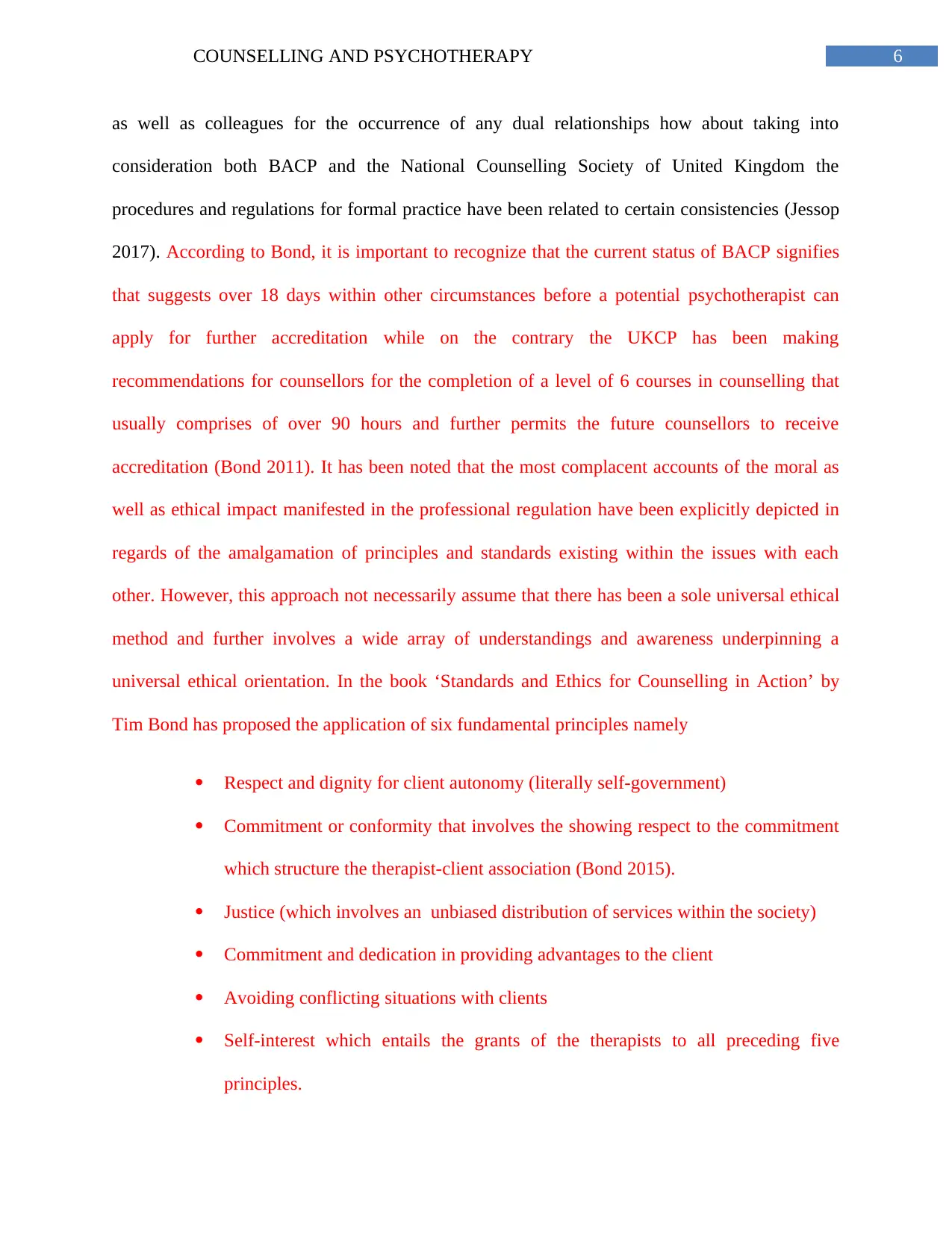
6COUNSELLING AND PSYCHOTHERAPY
as well as colleagues for the occurrence of any dual relationships how about taking into
consideration both BACP and the National Counselling Society of United Kingdom the
procedures and regulations for formal practice have been related to certain consistencies (Jessop
2017). According to Bond, it is important to recognize that the current status of BACP signifies
that suggests over 18 days within other circumstances before a potential psychotherapist can
apply for further accreditation while on the contrary the UKCP has been making
recommendations for counsellors for the completion of a level of 6 courses in counselling that
usually comprises of over 90 hours and further permits the future counsellors to receive
accreditation (Bond 2011). It has been noted that the most complacent accounts of the moral as
well as ethical impact manifested in the professional regulation have been explicitly depicted in
regards of the amalgamation of principles and standards existing within the issues with each
other. However, this approach not necessarily assume that there has been a sole universal ethical
method and further involves a wide array of understandings and awareness underpinning a
universal ethical orientation. In the book ‘Standards and Ethics for Counselling in Action’ by
Tim Bond has proposed the application of six fundamental principles namely
Respect and dignity for client autonomy (literally self-government)
Commitment or conformity that involves the showing respect to the commitment
which structure the therapist-client association (Bond 2015).
Justice (which involves an unbiased distribution of services within the society)
Commitment and dedication in providing advantages to the client
Avoiding conflicting situations with clients
Self-interest which entails the grants of the therapists to all preceding five
principles.
as well as colleagues for the occurrence of any dual relationships how about taking into
consideration both BACP and the National Counselling Society of United Kingdom the
procedures and regulations for formal practice have been related to certain consistencies (Jessop
2017). According to Bond, it is important to recognize that the current status of BACP signifies
that suggests over 18 days within other circumstances before a potential psychotherapist can
apply for further accreditation while on the contrary the UKCP has been making
recommendations for counsellors for the completion of a level of 6 courses in counselling that
usually comprises of over 90 hours and further permits the future counsellors to receive
accreditation (Bond 2011). It has been noted that the most complacent accounts of the moral as
well as ethical impact manifested in the professional regulation have been explicitly depicted in
regards of the amalgamation of principles and standards existing within the issues with each
other. However, this approach not necessarily assume that there has been a sole universal ethical
method and further involves a wide array of understandings and awareness underpinning a
universal ethical orientation. In the book ‘Standards and Ethics for Counselling in Action’ by
Tim Bond has proposed the application of six fundamental principles namely
Respect and dignity for client autonomy (literally self-government)
Commitment or conformity that involves the showing respect to the commitment
which structure the therapist-client association (Bond 2015).
Justice (which involves an unbiased distribution of services within the society)
Commitment and dedication in providing advantages to the client
Avoiding conflicting situations with clients
Self-interest which entails the grants of the therapists to all preceding five
principles.
Paraphrase This Document
Need a fresh take? Get an instant paraphrase of this document with our AI Paraphraser
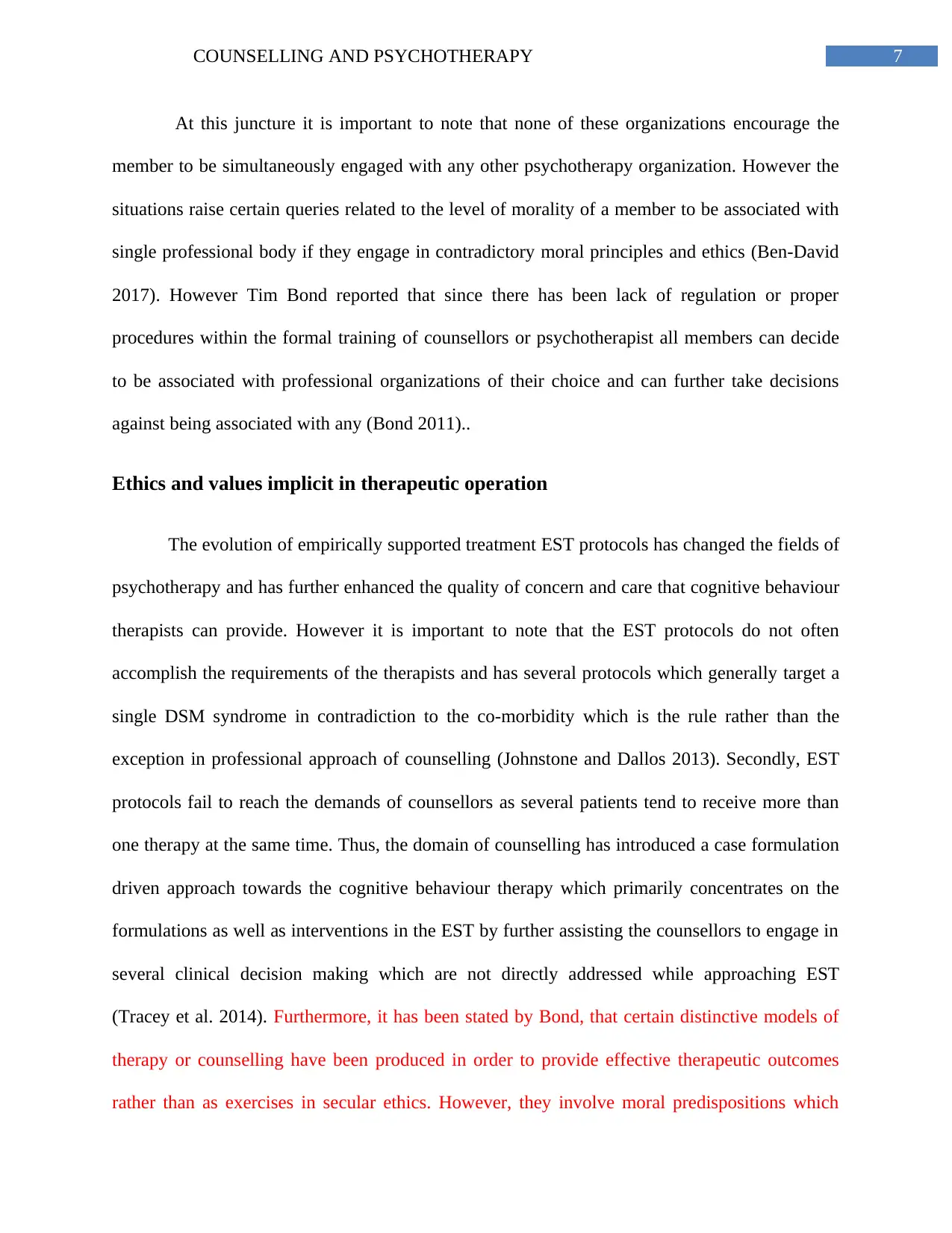
7COUNSELLING AND PSYCHOTHERAPY
At this juncture it is important to note that none of these organizations encourage the
member to be simultaneously engaged with any other psychotherapy organization. However the
situations raise certain queries related to the level of morality of a member to be associated with
single professional body if they engage in contradictory moral principles and ethics (Ben-David
2017). However Tim Bond reported that since there has been lack of regulation or proper
procedures within the formal training of counsellors or psychotherapist all members can decide
to be associated with professional organizations of their choice and can further take decisions
against being associated with any (Bond 2011)..
Ethics and values implicit in therapeutic operation
The evolution of empirically supported treatment EST protocols has changed the fields of
psychotherapy and has further enhanced the quality of concern and care that cognitive behaviour
therapists can provide. However it is important to note that the EST protocols do not often
accomplish the requirements of the therapists and has several protocols which generally target a
single DSM syndrome in contradiction to the co-morbidity which is the rule rather than the
exception in professional approach of counselling (Johnstone and Dallos 2013). Secondly, EST
protocols fail to reach the demands of counsellors as several patients tend to receive more than
one therapy at the same time. Thus, the domain of counselling has introduced a case formulation
driven approach towards the cognitive behaviour therapy which primarily concentrates on the
formulations as well as interventions in the EST by further assisting the counsellors to engage in
several clinical decision making which are not directly addressed while approaching EST
(Tracey et al. 2014). Furthermore, it has been stated by Bond, that certain distinctive models of
therapy or counselling have been produced in order to provide effective therapeutic outcomes
rather than as exercises in secular ethics. However, they involve moral predispositions which
At this juncture it is important to note that none of these organizations encourage the
member to be simultaneously engaged with any other psychotherapy organization. However the
situations raise certain queries related to the level of morality of a member to be associated with
single professional body if they engage in contradictory moral principles and ethics (Ben-David
2017). However Tim Bond reported that since there has been lack of regulation or proper
procedures within the formal training of counsellors or psychotherapist all members can decide
to be associated with professional organizations of their choice and can further take decisions
against being associated with any (Bond 2011)..
Ethics and values implicit in therapeutic operation
The evolution of empirically supported treatment EST protocols has changed the fields of
psychotherapy and has further enhanced the quality of concern and care that cognitive behaviour
therapists can provide. However it is important to note that the EST protocols do not often
accomplish the requirements of the therapists and has several protocols which generally target a
single DSM syndrome in contradiction to the co-morbidity which is the rule rather than the
exception in professional approach of counselling (Johnstone and Dallos 2013). Secondly, EST
protocols fail to reach the demands of counsellors as several patients tend to receive more than
one therapy at the same time. Thus, the domain of counselling has introduced a case formulation
driven approach towards the cognitive behaviour therapy which primarily concentrates on the
formulations as well as interventions in the EST by further assisting the counsellors to engage in
several clinical decision making which are not directly addressed while approaching EST
(Tracey et al. 2014). Furthermore, it has been stated by Bond, that certain distinctive models of
therapy or counselling have been produced in order to provide effective therapeutic outcomes
rather than as exercises in secular ethics. However, they involve moral predispositions which
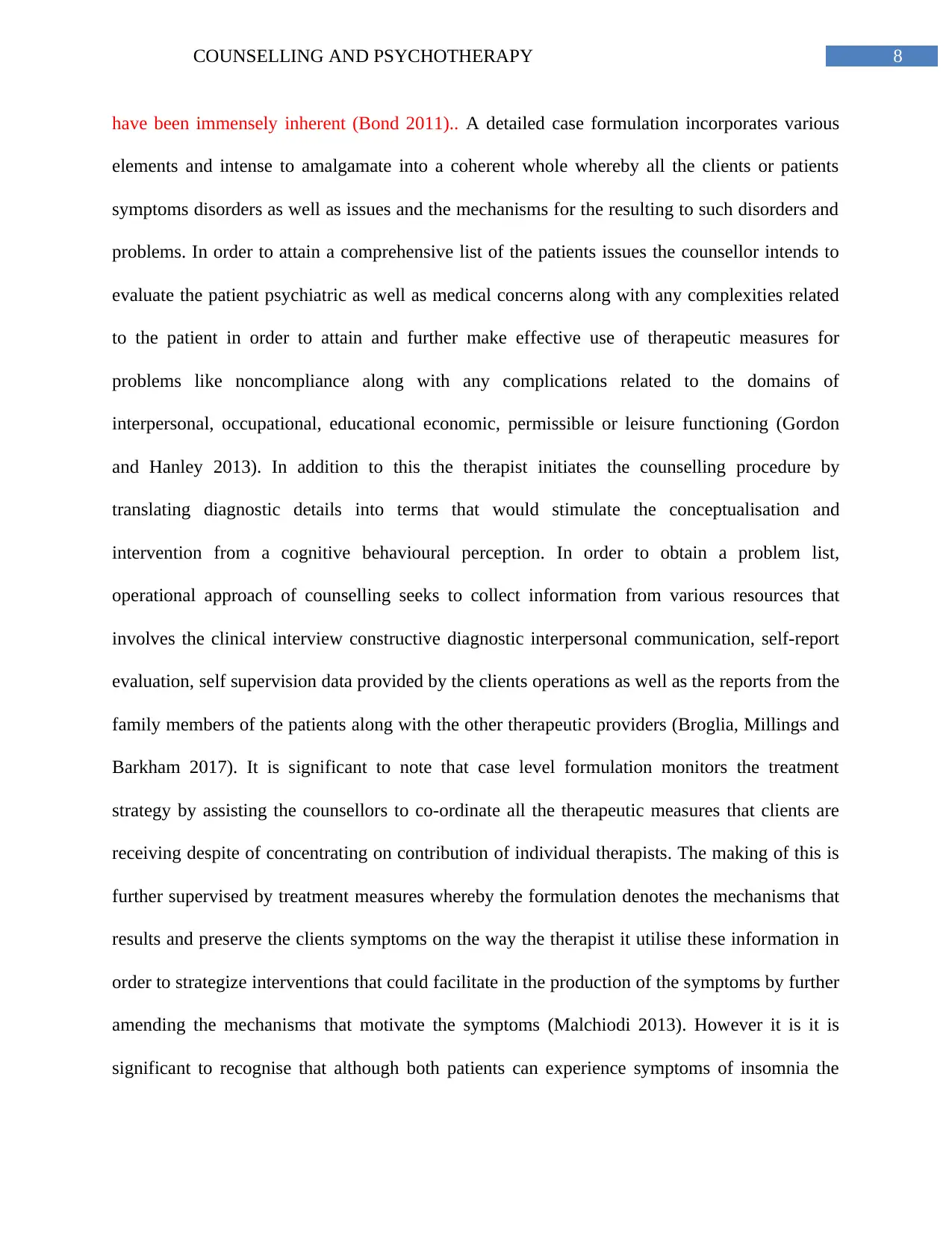
8COUNSELLING AND PSYCHOTHERAPY
have been immensely inherent (Bond 2011).. A detailed case formulation incorporates various
elements and intense to amalgamate into a coherent whole whereby all the clients or patients
symptoms disorders as well as issues and the mechanisms for the resulting to such disorders and
problems. In order to attain a comprehensive list of the patients issues the counsellor intends to
evaluate the patient psychiatric as well as medical concerns along with any complexities related
to the patient in order to attain and further make effective use of therapeutic measures for
problems like noncompliance along with any complications related to the domains of
interpersonal, occupational, educational economic, permissible or leisure functioning (Gordon
and Hanley 2013). In addition to this the therapist initiates the counselling procedure by
translating diagnostic details into terms that would stimulate the conceptualisation and
intervention from a cognitive behavioural perception. In order to obtain a problem list,
operational approach of counselling seeks to collect information from various resources that
involves the clinical interview constructive diagnostic interpersonal communication, self-report
evaluation, self supervision data provided by the clients operations as well as the reports from the
family members of the patients along with the other therapeutic providers (Broglia, Millings and
Barkham 2017). It is significant to note that case level formulation monitors the treatment
strategy by assisting the counsellors to co-ordinate all the therapeutic measures that clients are
receiving despite of concentrating on contribution of individual therapists. The making of this is
further supervised by treatment measures whereby the formulation denotes the mechanisms that
results and preserve the clients symptoms on the way the therapist it utilise these information in
order to strategize interventions that could facilitate in the production of the symptoms by further
amending the mechanisms that motivate the symptoms (Malchiodi 2013). However it is it is
significant to recognise that although both patients can experience symptoms of insomnia the
have been immensely inherent (Bond 2011).. A detailed case formulation incorporates various
elements and intense to amalgamate into a coherent whole whereby all the clients or patients
symptoms disorders as well as issues and the mechanisms for the resulting to such disorders and
problems. In order to attain a comprehensive list of the patients issues the counsellor intends to
evaluate the patient psychiatric as well as medical concerns along with any complexities related
to the patient in order to attain and further make effective use of therapeutic measures for
problems like noncompliance along with any complications related to the domains of
interpersonal, occupational, educational economic, permissible or leisure functioning (Gordon
and Hanley 2013). In addition to this the therapist initiates the counselling procedure by
translating diagnostic details into terms that would stimulate the conceptualisation and
intervention from a cognitive behavioural perception. In order to obtain a problem list,
operational approach of counselling seeks to collect information from various resources that
involves the clinical interview constructive diagnostic interpersonal communication, self-report
evaluation, self supervision data provided by the clients operations as well as the reports from the
family members of the patients along with the other therapeutic providers (Broglia, Millings and
Barkham 2017). It is significant to note that case level formulation monitors the treatment
strategy by assisting the counsellors to co-ordinate all the therapeutic measures that clients are
receiving despite of concentrating on contribution of individual therapists. The making of this is
further supervised by treatment measures whereby the formulation denotes the mechanisms that
results and preserve the clients symptoms on the way the therapist it utilise these information in
order to strategize interventions that could facilitate in the production of the symptoms by further
amending the mechanisms that motivate the symptoms (Malchiodi 2013). However it is it is
significant to recognise that although both patients can experience symptoms of insomnia the
⊘ This is a preview!⊘
Do you want full access?
Subscribe today to unlock all pages.

Trusted by 1+ million students worldwide
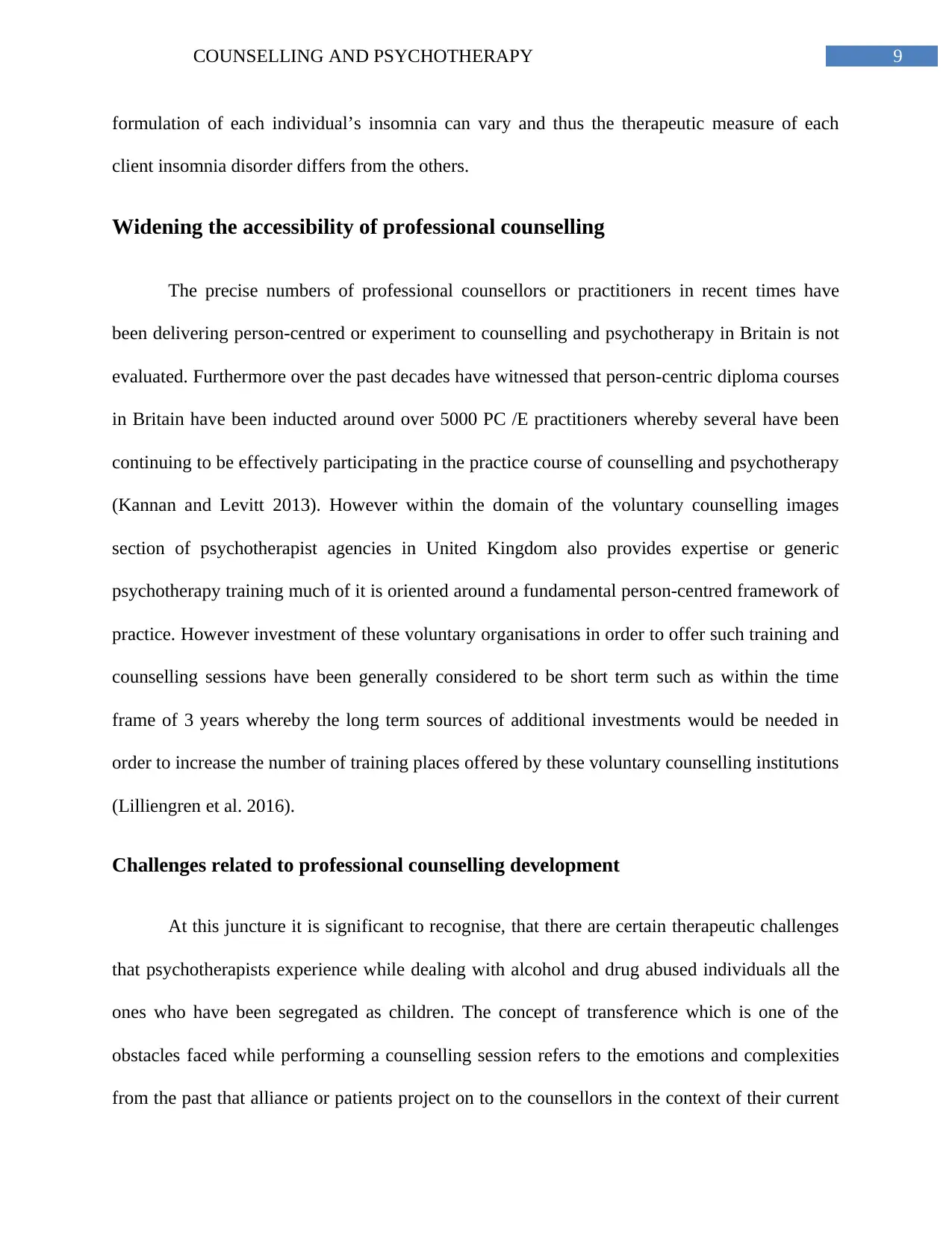
9COUNSELLING AND PSYCHOTHERAPY
formulation of each individual’s insomnia can vary and thus the therapeutic measure of each
client insomnia disorder differs from the others.
Widening the accessibility of professional counselling
The precise numbers of professional counsellors or practitioners in recent times have
been delivering person-centred or experiment to counselling and psychotherapy in Britain is not
evaluated. Furthermore over the past decades have witnessed that person-centric diploma courses
in Britain have been inducted around over 5000 PC /E practitioners whereby several have been
continuing to be effectively participating in the practice course of counselling and psychotherapy
(Kannan and Levitt 2013). However within the domain of the voluntary counselling images
section of psychotherapist agencies in United Kingdom also provides expertise or generic
psychotherapy training much of it is oriented around a fundamental person-centred framework of
practice. However investment of these voluntary organisations in order to offer such training and
counselling sessions have been generally considered to be short term such as within the time
frame of 3 years whereby the long term sources of additional investments would be needed in
order to increase the number of training places offered by these voluntary counselling institutions
(Lilliengren et al. 2016).
Challenges related to professional counselling development
At this juncture it is significant to recognise, that there are certain therapeutic challenges
that psychotherapists experience while dealing with alcohol and drug abused individuals all the
ones who have been segregated as children. The concept of transference which is one of the
obstacles faced while performing a counselling session refers to the emotions and complexities
from the past that alliance or patients project on to the counsellors in the context of their current
formulation of each individual’s insomnia can vary and thus the therapeutic measure of each
client insomnia disorder differs from the others.
Widening the accessibility of professional counselling
The precise numbers of professional counsellors or practitioners in recent times have
been delivering person-centred or experiment to counselling and psychotherapy in Britain is not
evaluated. Furthermore over the past decades have witnessed that person-centric diploma courses
in Britain have been inducted around over 5000 PC /E practitioners whereby several have been
continuing to be effectively participating in the practice course of counselling and psychotherapy
(Kannan and Levitt 2013). However within the domain of the voluntary counselling images
section of psychotherapist agencies in United Kingdom also provides expertise or generic
psychotherapy training much of it is oriented around a fundamental person-centred framework of
practice. However investment of these voluntary organisations in order to offer such training and
counselling sessions have been generally considered to be short term such as within the time
frame of 3 years whereby the long term sources of additional investments would be needed in
order to increase the number of training places offered by these voluntary counselling institutions
(Lilliengren et al. 2016).
Challenges related to professional counselling development
At this juncture it is significant to recognise, that there are certain therapeutic challenges
that psychotherapists experience while dealing with alcohol and drug abused individuals all the
ones who have been segregated as children. The concept of transference which is one of the
obstacles faced while performing a counselling session refers to the emotions and complexities
from the past that alliance or patients project on to the counsellors in the context of their current
Paraphrase This Document
Need a fresh take? Get an instant paraphrase of this document with our AI Paraphraser
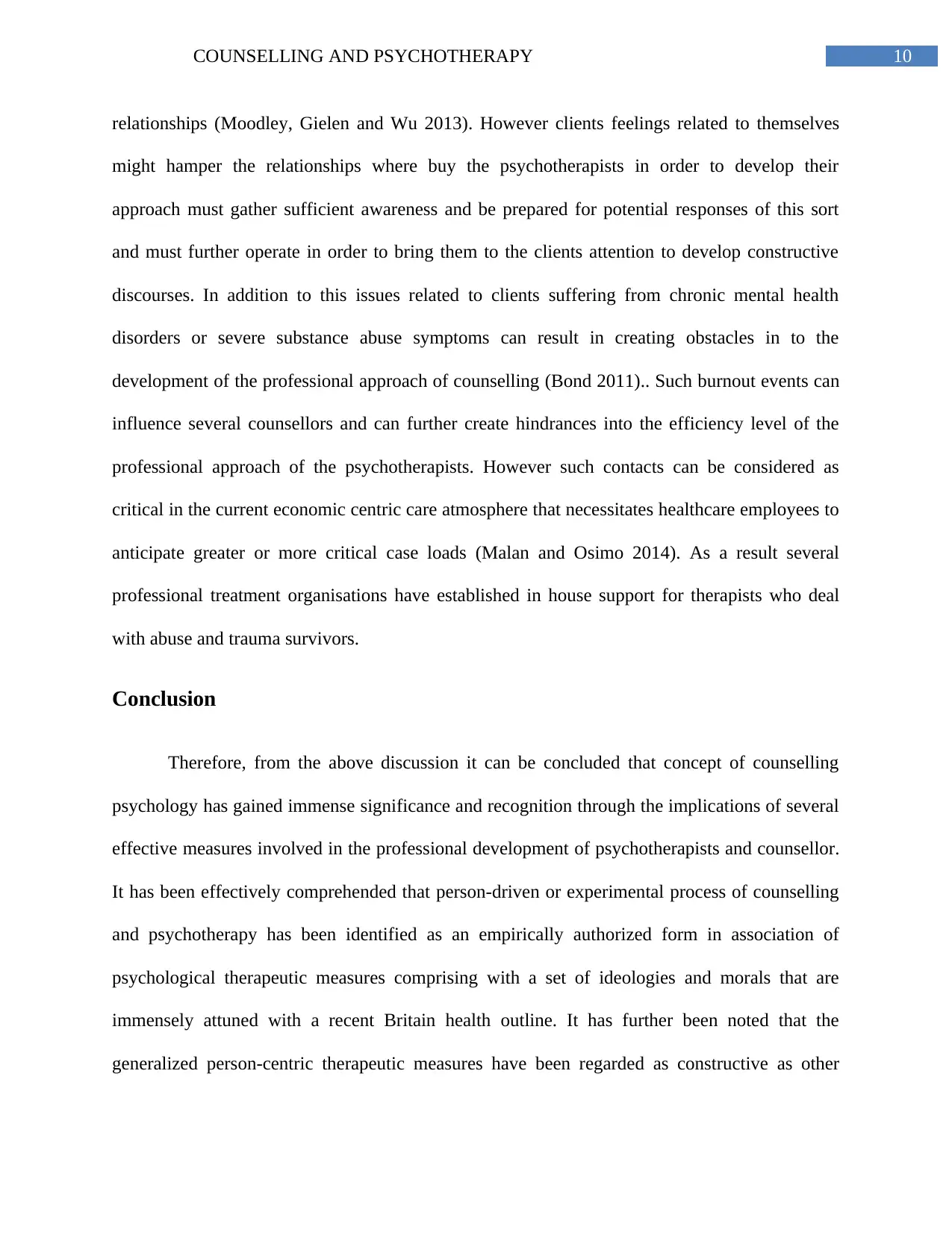
10COUNSELLING AND PSYCHOTHERAPY
relationships (Moodley, Gielen and Wu 2013). However clients feelings related to themselves
might hamper the relationships where buy the psychotherapists in order to develop their
approach must gather sufficient awareness and be prepared for potential responses of this sort
and must further operate in order to bring them to the clients attention to develop constructive
discourses. In addition to this issues related to clients suffering from chronic mental health
disorders or severe substance abuse symptoms can result in creating obstacles in to the
development of the professional approach of counselling (Bond 2011).. Such burnout events can
influence several counsellors and can further create hindrances into the efficiency level of the
professional approach of the psychotherapists. However such contacts can be considered as
critical in the current economic centric care atmosphere that necessitates healthcare employees to
anticipate greater or more critical case loads (Malan and Osimo 2014). As a result several
professional treatment organisations have established in house support for therapists who deal
with abuse and trauma survivors.
Conclusion
Therefore, from the above discussion it can be concluded that concept of counselling
psychology has gained immense significance and recognition through the implications of several
effective measures involved in the professional development of psychotherapists and counsellor.
It has been effectively comprehended that person-driven or experimental process of counselling
and psychotherapy has been identified as an empirically authorized form in association of
psychological therapeutic measures comprising with a set of ideologies and morals that are
immensely attuned with a recent Britain health outline. It has further been noted that the
generalized person-centric therapeutic measures have been regarded as constructive as other
relationships (Moodley, Gielen and Wu 2013). However clients feelings related to themselves
might hamper the relationships where buy the psychotherapists in order to develop their
approach must gather sufficient awareness and be prepared for potential responses of this sort
and must further operate in order to bring them to the clients attention to develop constructive
discourses. In addition to this issues related to clients suffering from chronic mental health
disorders or severe substance abuse symptoms can result in creating obstacles in to the
development of the professional approach of counselling (Bond 2011).. Such burnout events can
influence several counsellors and can further create hindrances into the efficiency level of the
professional approach of the psychotherapists. However such contacts can be considered as
critical in the current economic centric care atmosphere that necessitates healthcare employees to
anticipate greater or more critical case loads (Malan and Osimo 2014). As a result several
professional treatment organisations have established in house support for therapists who deal
with abuse and trauma survivors.
Conclusion
Therefore, from the above discussion it can be concluded that concept of counselling
psychology has gained immense significance and recognition through the implications of several
effective measures involved in the professional development of psychotherapists and counsellor.
It has been effectively comprehended that person-driven or experimental process of counselling
and psychotherapy has been identified as an empirically authorized form in association of
psychological therapeutic measures comprising with a set of ideologies and morals that are
immensely attuned with a recent Britain health outline. It has further been noted that the
generalized person-centric therapeutic measures have been regarded as constructive as other
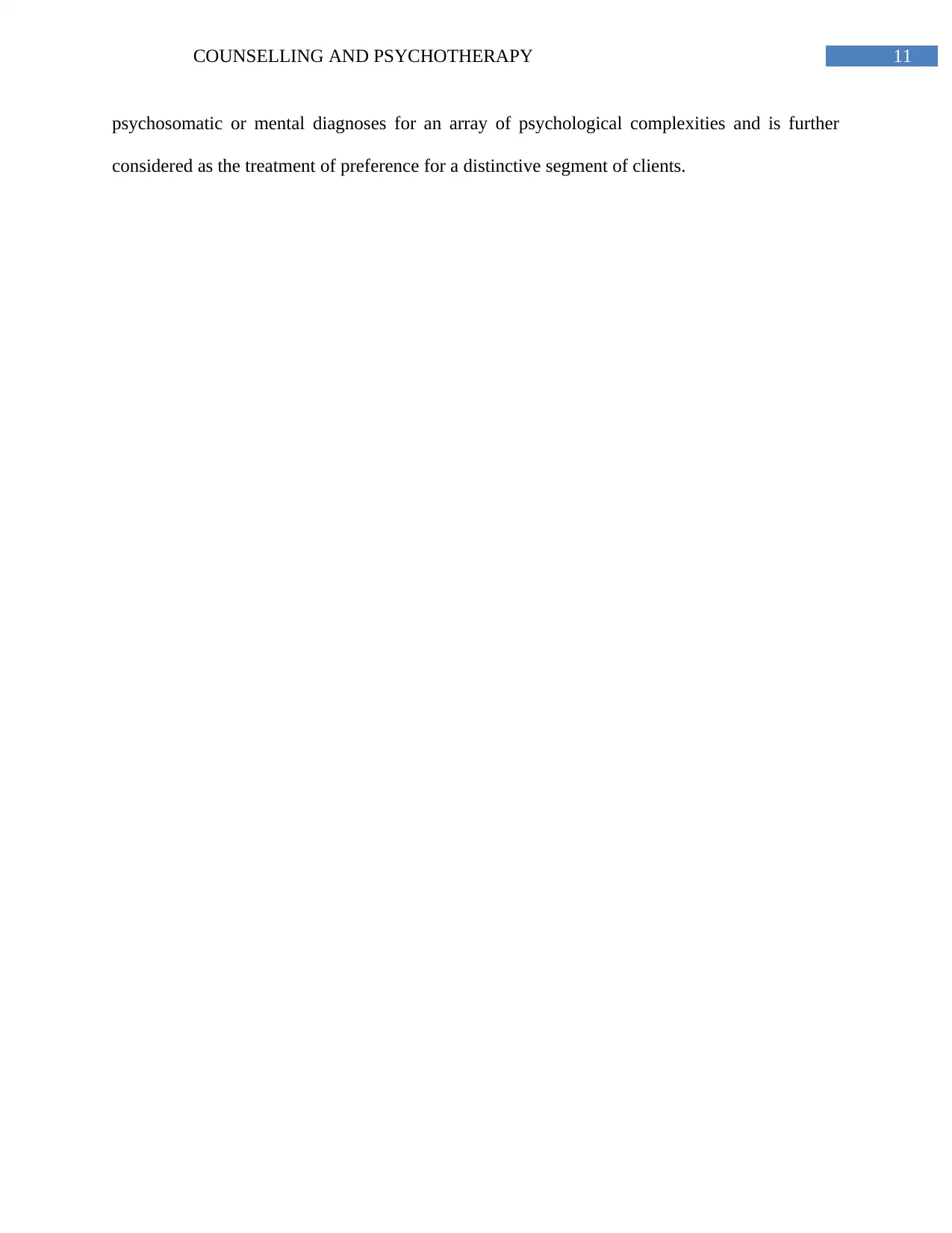
11COUNSELLING AND PSYCHOTHERAPY
psychosomatic or mental diagnoses for an array of psychological complexities and is further
considered as the treatment of preference for a distinctive segment of clients.
psychosomatic or mental diagnoses for an array of psychological complexities and is further
considered as the treatment of preference for a distinctive segment of clients.
⊘ This is a preview!⊘
Do you want full access?
Subscribe today to unlock all pages.

Trusted by 1+ million students worldwide
1 out of 16
Your All-in-One AI-Powered Toolkit for Academic Success.
+13062052269
info@desklib.com
Available 24*7 on WhatsApp / Email
![[object Object]](/_next/static/media/star-bottom.7253800d.svg)
Unlock your academic potential
Copyright © 2020–2026 A2Z Services. All Rights Reserved. Developed and managed by ZUCOL.

